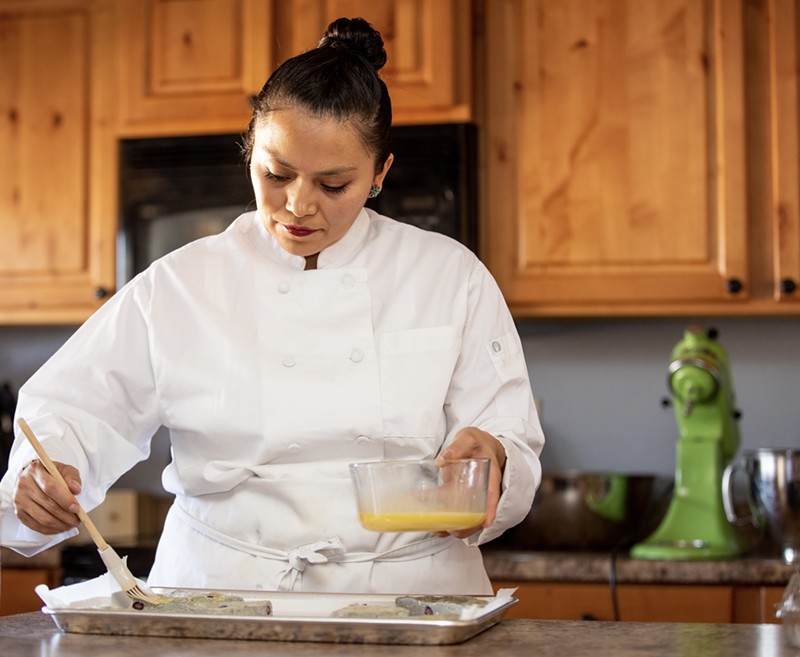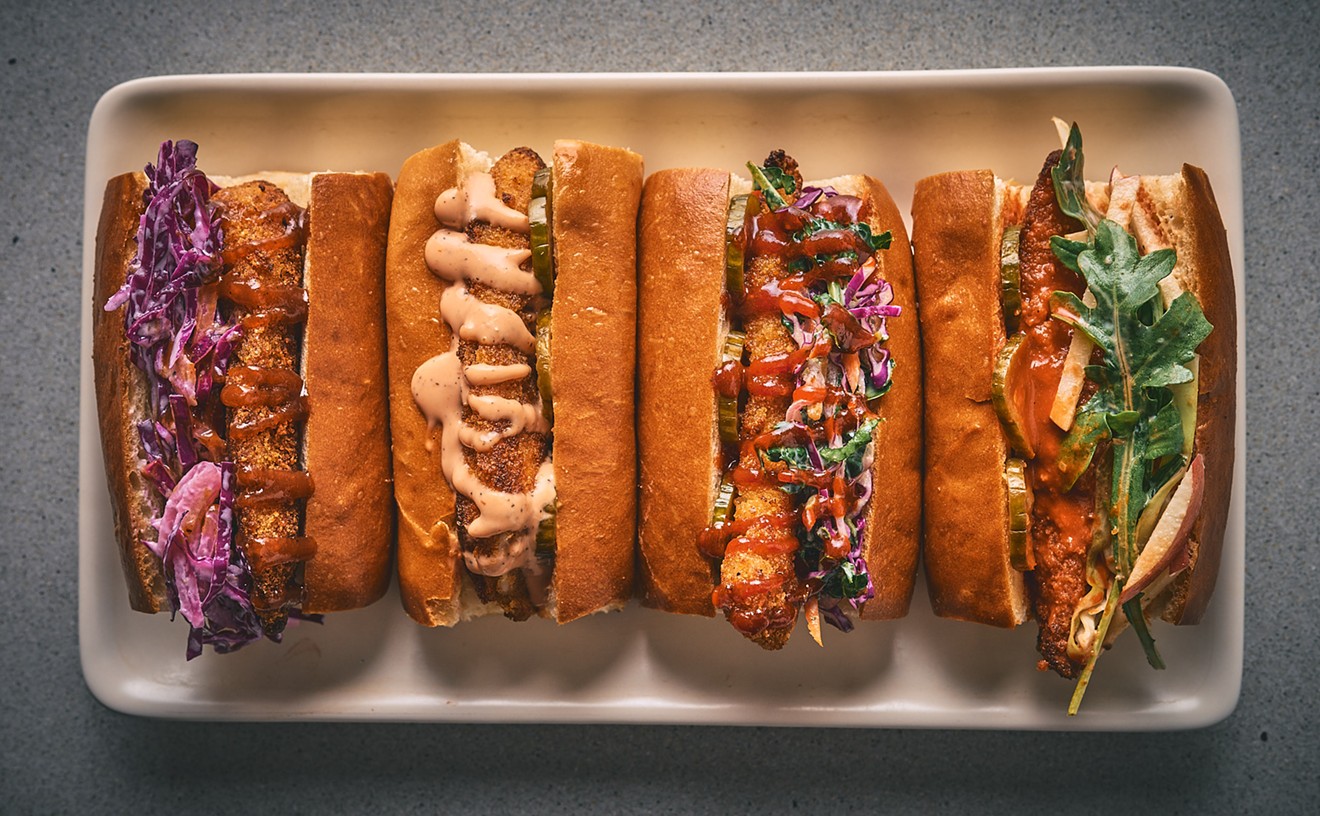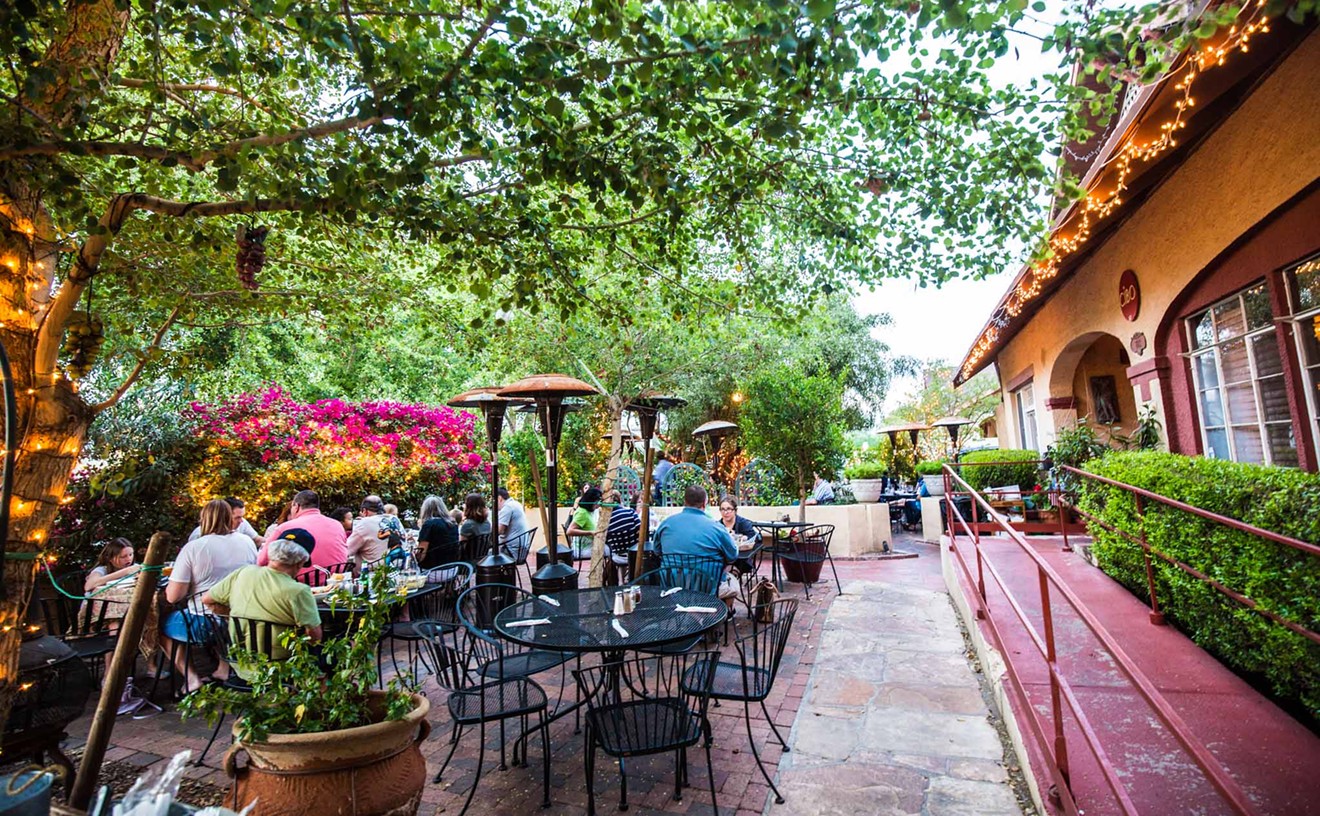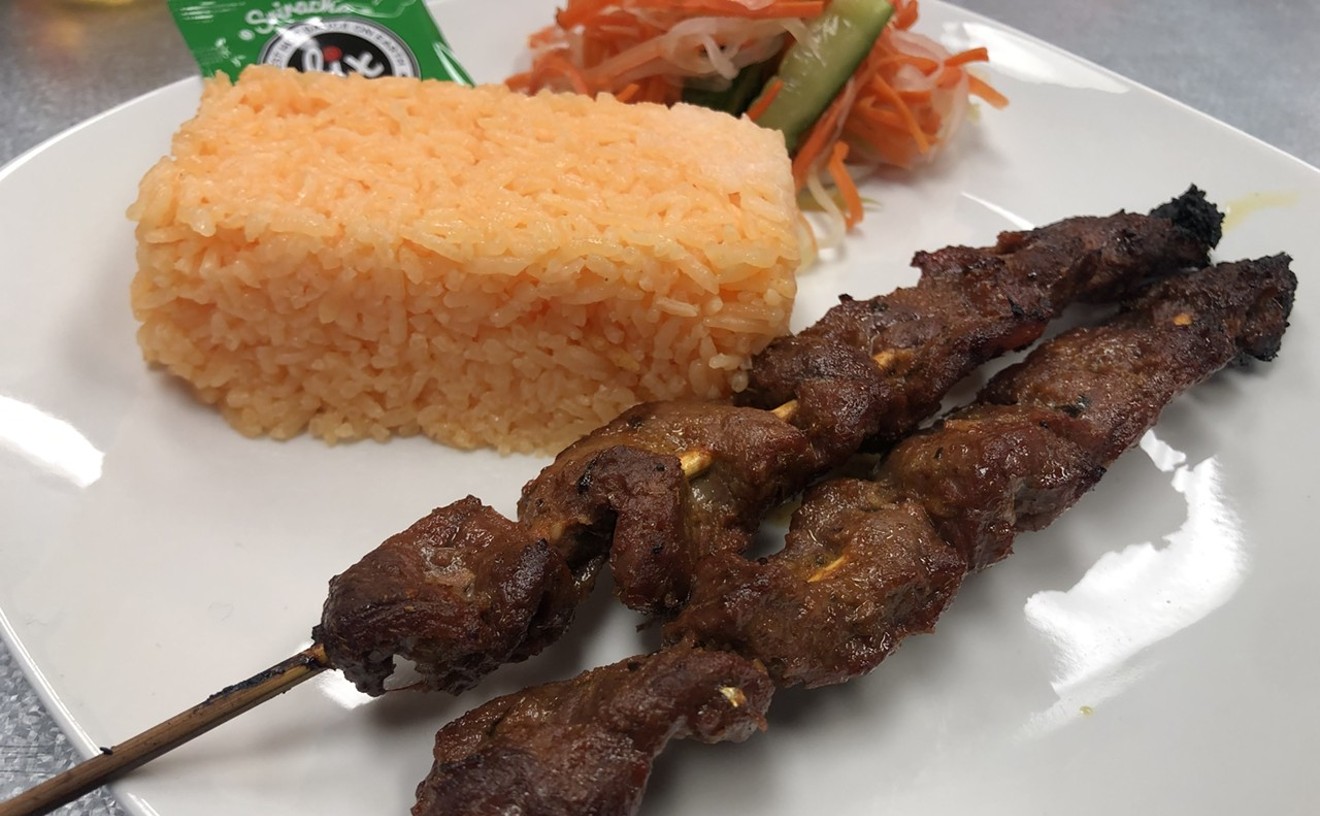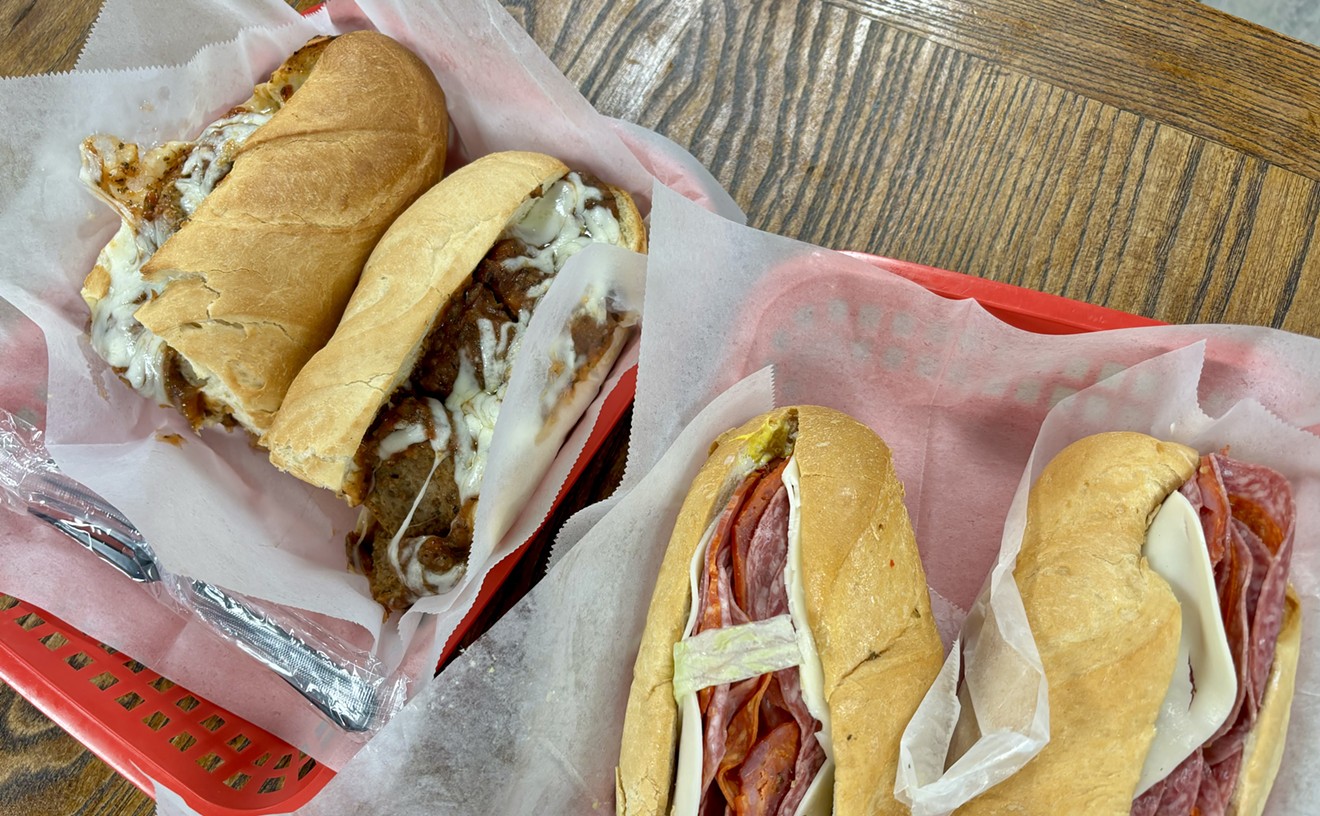“I was very rebellious,” she says.
But, she watched her mother and saw how she worked to incorporate healthy, fresh foods into the family's meals over more readily available, cheaper processed foods. It wasn’t until Roessel was married and became a mother herself that she realized the importance of what her mom was doing and the ingredients she used.
Roessel began trying things in the kitchen. Her experiments eventually led her to attend culinary school and stage at Kai, the Phoenix fine dining restaurant whose menu is inspired by the cuisine of Indigenous peoples in Arizona. Afterward, she set out to start a food business – launching the local baked goods company Scone On? in 2019.

The Grandma Scone by Scone On? incorporates some of owner Thalia Roessel's grandmother's favorite things: apricots, piñon and blue corn.
Roshan Spottsville
A story of home in a scone
Roessel found herself gravitating toward using ingredients from home, such as blue corn, piñon and sumac.“Solely focusing on indigenous foods wasn’t something that I initially thought I wanted to do, but in a way, it was already instilled in me by my mom,” she says.
Roessel has found it’s also resonated with her customers.
“It reminded them of home and it sparked a fond memory of their childhood,” she says.
Starting conversations about those ingredients likewise gives her a way to share her pride for her heritage, and the foods and recipes tied to it.
“Having indigenous ingredients is really important because I think we’re at a time where we’re understanding our health, we’re understanding who we are as people,” she says. “Even just in the North American region, knowing that indigenous recipes have always been here, but they just haven’t been identified as that.”
It’s an ongoing push and conversation in food circles, particularly as more Native American chefs are spotlighted through culinary awards and documentaries like “Gather.” But those discussions are also tied to the history of colonization and the subsequent subjugation of Native Americans, which included disconnecting people from their traditional foods and practices.
“The way to control people is to control their food,” says Maria Del Carmen Parra Cano, an ancestral foods chef and co-founder of Food Forest Cooperative, a regenerative farm growing edible and medicinal plants in South Phoenix. “That’s such a big thing that’s been happening for hundreds of years.”

Ancestral foods chef Maria Del Carmen Parra Cano advocates for using food as medicine and is part of a farming cooperative in South Phoenix.
Meckler Photography
What is food sovereignty?
Efforts to regain that access and control are part of the movement toward food sovereignty, a term coined in 1996 by the international farmers’ organization La Via Campesina, outlining the right of people to define their own agricultural and food policies.As the movement has grown and evolved, so too has people's understanding of food sovereignty – and there’s no universal definition. In Arizona, the efforts around indigenous food sovereignty span from land access and seed saving to cooking and advocacy.

Rafael Tapia is the Director of Tribal Community Connections at Local First Arizona.
Local First Arizona
“Food sovereignty is not our word,” says Tapia, who is a member of the Pascua Yaqui Tribe. “For tribal and Indigenous people, not just in this country but around the world, food is holistic. It’s not just a physical consumption of food, there’s a spiritual, emotional, mental aspect to it.”
Roessel echoes Tapia, noting the importance of corn to the Navajo people, not only for sustenance but also in rites, ceremonies and medicine.
For Parra Cano, using food as medicine changed her life, she says. After delivering her fourth and final child, she suffered from postpartum preeclampsia, a potentially dangerous complication characterized by high blood pressure. It left her bedridden for months. But, she had a network of women through her community and the Cihuapactli Collective, of which she is a co-founder and CEO, who supported her by making ancestral Mexican foods for her and her family to eat. She recovered, no longer needing hypertension medication. Issues with diabetes and liver disease likewise abated, she says.
“That really put things into perspective for me how our food is medicine,” she says.
That experience sparked the launch of Sana Sana Foods – a food truck that Parra Cano has since evolved into a catering and food education business. Wanting to be more self-sufficient, Parra Cano, her husband Brian and their business partners also acquired an acre of land – with plans to expand – to launch the Food Forest Cooperative. Having access to that land ensures she and co-op members can grow some of those ancestral foods right in the Valley and share them with the community.
“Food sovereignty, for me, it’s having access to healthy foods, regardless of where you’re from,” she says.
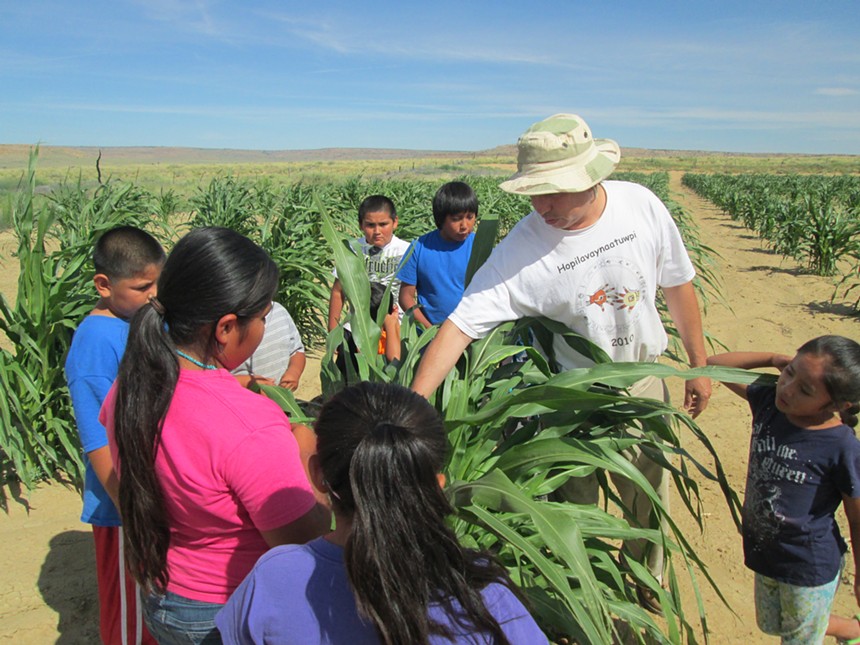
Agricultural education is a passion for Dr. Michael Kotutwa Johnson. He is working with Head Start in Tucson to pilot a program that brings seeds and gardening to children at early education centers.
Michael Kotutwa Johnson
Sovereignty from seed to plate
But that access – through land, water and seeds – is a key part of food sovereignty. And not just any garden center seeds, they must be acclimatized to Arizona’s often harsh, dry conditions and culturally relevant to the people who will ultimately consume their fruits.Dr. Michael Kotutwa Johnson is a professor at the University of Arizona, assistant specialist of the Indigenous Resilency Center and a dry farmer – a practice he learned from his grandfather while spending summers on the Hopi Reservation east of the Grand Canyon.
“Food sovereignty means to me the ability to raise those crops which we have become dependent upon for survival,” Kotutwa Johnson says. “It also has to incorporate land sovereignty.”
For the Hopi, planting a seed is an act of faith, he says.
“It’s not just about farming, but it’s about the whole aspect of human well-being, the cultural understandings we have and the relationships we have with our crops,” Kotutwa Johnson says.

Michael Kotutwa Johnson's harvest from his dry farm on the Hopi Reservation.
Michael Kotutwa Johnson
“I think it’s really important to continue to incorporate and hold onto the sovereignty of who we are and our food,” Roessel says.
These conversations are just the beginning of a long effort to restore food sovereignty. Across Arizona, Native American chefs, farmers and advocates are working to celebrate their heritage and bring the state’s earliest foods back to the table.
“The whole word about sovereignty is really about the recognition of Indigenous people and the resiliency that we have,” Kotutwa Johnson says.

